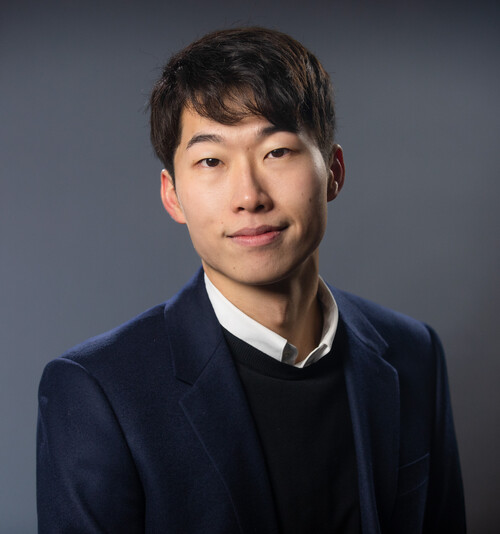Jinyoung Seo

Earth is getting hotter. Much hotter. A 2022 Washington Post analysis of data from the nonprofit First Street Foundation projected that 63 percent of the US population will experience an average of at least three consecutive days of 100-degree heat every year—up from 46 percent today. In parts of the South and Southwest, residents could see as many as 70 consecutive days of temperatures over 100. And yet, the Post reports, the populations of Arizona, Texas, and Florida, which will be hardest hit by the warming trends, continue to expand faster than those of other states.
All of those people will need air conditioning and refrigeration to make life bearable. But Jinyoung Seo, a PhD student in chemistry and chemical biology at Harvard’s Graduate School of Arts and Sciences (GSAS), points out that the technologies that keep us cool are also the ones that make our planet warmer.
“Our current cooling systems rely on hydrofluorocarbon refrigerants,” says Seo. “Most of those are potent greenhouse gases. As the world gets hotter, we need new technologies that can keep us cool sustainably.”
Seo, a 2023 Harvard Horizons Scholar, has taken up this challenge. His Horizons project, “Reinventing Air Conditioning with Chemistry,” uses solid refrigerants to eliminate direct greenhouse gas emissions while making cooling systems smaller and vastly more efficient. Through this “solid-state cooling,” Seo says he hopes to reinvent air conditioning—and contribute to the fight against climate change.
A traditional air conditioning (AC) unit operates by compressing and expanding a refrigerant—usually a variant of the hydrofluorocarbons (HFCs), including freon. The refrigerant begins as a liquid and then changes to a gas as it absorbs heat from indoors and is sent to the unit’s compressor. That heat is then vented to the outdoors, which cools the refrigerant and shifts the phase back to a liquid. The cycle continues until the space reaches the desired temperature.
Although AC units have become more efficient over the decades, the basic mechanism for cooling has remained more or less the same ever since it was invented around 200 years ago. The problem, in an age of climate change, is that the HFC refrigerant is a major greenhouse gas. “It’s thousands of times more potent than carbon dioxide,” Seo says. “And, as you can imagine, the gas leaks out into the air as we use it. The HVAC industry has tried to adapt and use more sustainable agents in their units, but they still rely on greenhouse gases.”
For his Horizons project, Seo seeks to replace HFCs with a solid refrigerant. Unfortunately, solids are far less sensitive to pressure than liquids, making them poor coolants. But Seo has discovered a new class of solids that are extremely soft and behave much like liquids. “The material is a kind of mineral, but it contains both organic and inorganic components,” he says. “Its molecular structure reminds you of a cell membrane—long, fluffy, organic chains confined between layers. And the thing about cell membranes is that they’re dynamic. They move around. Depending on the temperature, they can go from a frozen, ordered chain to a disordered, dynamic chain. The same is true for these materials, and we leverage that phase transition for cooling. We still need a liquid like water to move the heat around, but the hard work is done by the solids.”
The Harvard community will be able to get a first look at how Seo’s solid refrigerant works—likely via video—on April 11 at the 2023 Harvard Horizons Symposium at Sanders Theatre. Developing a cleaner, smaller, more efficient air conditioner would be a major innovation. But Seo says that commercial invention is not actually what drives his work. He has a passion for basic research in molecular chemistry and wants to show that it can have unexpected benefits—including solutions that could help save the planet.
“I started my PhD thinking about ways to understand thermal energy in materials at the molecular level and somehow drifted to air conditioning,” Seo says. “So, my hope is actually to point out how molecular thinking can help us reconsider old technologies like air conditioning and tackle grand challenges like climate change. That’s what’s really exciting to me.”

